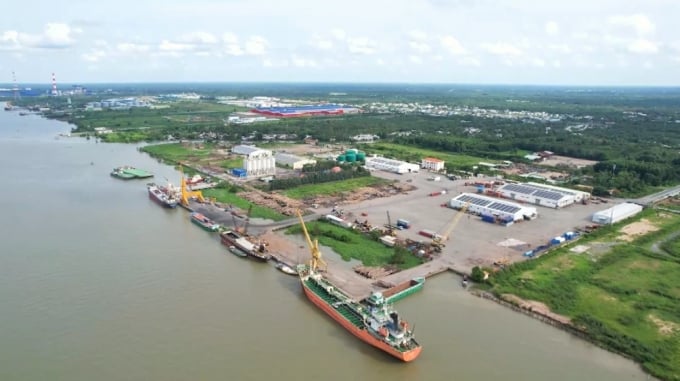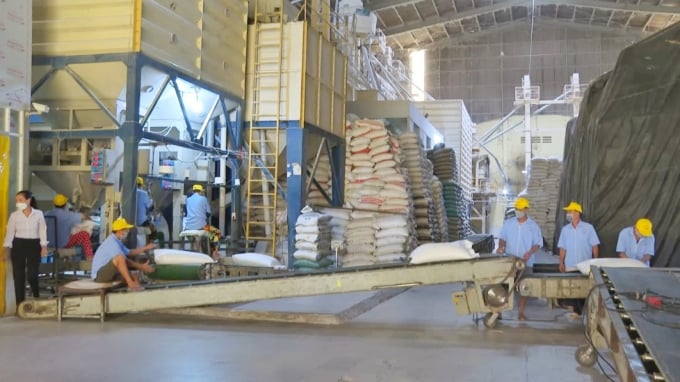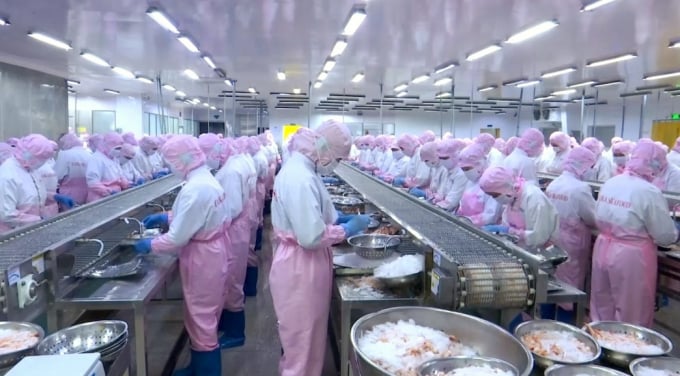June 17, 2025 | 12:52 GMT +7
June 17, 2025 | 12:52 GMT +7
Hotline: 0913.378.918
June 17, 2025 | 12:52 GMT +7
Hotline: 0913.378.918

Logistics services in the Mekong Delta have not yet met the requirements of export enterprises. Photo: Kim Anh.
The Mekong Delta is known as a bountiful agricultural zone - the ‘granary’ of rice and fruit with vast acreage and high yield. The annual rice output is approximately 24 million tons. It provides 90% of rice exported to more than 150 countries, helping Vietnam earn USD 2-3 billion per year. Fruit trees are estimated to have a total area of 364,000 ha in 2021, equal to 31% of the whole country's fruit tree area. And the Mekong Delta is also the largest aquaculture area in the country with an area of over 800,000 ha.
But it is a fact that some products have value but the competitiveness is lacking, which the main cause is that the logistics service of the region has not met the requirements.
Ngoc Quang Phat Import-Export Joint Stock Company (Ngoc Quang Phat Co.), an enterprise in Thot Not district (Can Tho) specializing in exporting rice shares the same difficulties. Many orders and contracts of enterprises have been signed, but when the goods are out for shipment, a situation arises as there is a lack of containers, or even no container available for export. Ms. Huynh Thi Bich Huyen, Director of Ngoc Quang Phat Company, said, “It is the influence of the transportation stage in export that makes it one of the reasons why rice remains low in terms of prices and output.”

The lack of containers is an obstacle that some exporting enterprises in the Mekong Delta have to face at present. Photo: Kim Anh.
According to a study by the World Bank (WB), every year the Mekong Delta region has an export demand of up to 18 million tons of goods. The region, however, lacks key logistics centers, satellite center systems, empty container yards and warehouse systems at ports. Vietnam Logistics Business Association (VLA) cites that the total number of logistics enterprises in the Mekong Delta’s 13 provinces and cities is only 1,461. These enterprises occupy approximately 4.39% of the number of logistics enterprises in the country, mainly SMEs or agricultural enterprises that provide logistics infrastructure for their own products. Enterprises providing professional logistics services are still at a very limited figure.
“A number of export enterprises with strong potential and resources currently tend to take care of their own pre-processing stage. Businesses that have not been able to equip themselves are forced to look for outsourcing units which increase output costs and cause them to be passive in terms of product quality,” said Ms. Nguyen Tu Quyen, Chairwoman of the Board of Directors of CMU Logistics Co., Ltd (Ho Chi Minh city).

The number of logistics enterprises in the Mekong Delta only accounts for approximately 4.39% of the number of logistics enterprises in Vietnam. Photo: Kim Anh.
The National Assembly's Resolution 45/2022/QH15 on piloting a number of specific mechanisms and policies for the development of Can Tho city has mentioned the establishment of a center for joint production, processing and consumption of agro-products in the Mekong Delta. The center is expected to be a multi-service destination, creating a foundation for Can Tho to attract investment in order to develop a logistics system specifically for the agriculture sector.
Mr. Tran Thanh Hai, Deputy Director of the Import-Export Department, Ministry of Industry and Trade, deems it essential to create a link between commercial production enterprises and logistics enterprises in the region. “This is the responsibility of businesses, but the promoting role of State agencies as well as associations including the role of the Vietnam Chamber of Commerce and Industry (VCCI) must also be put into the equation.”

Logistics plays an important role in the development of the Mekong Delta’s agricultural, forestry and fishery industries. Photo: Kim Anh.
Localities in the Mekong Delta need to take advantage of the source of agricultural goods, focus on strengthening regional linkages to facilitate agro-product trade, improve the quality of regional logistics planning, and devise policies to remove existing difficulties and attract investment in logistics activities.
With the policy of focusing on agro-forestry-fishery product quality, increasing the rate of deep processing in all item categories, and effectively implementing the value chain of goods, the role of logistics has become a very important key to realizing these goals.
Translated by Samuel Pham

(VAN) The UNESCO Global Geopark revalidation of Non nuoc Cao Bang and the transition to a two-tier administrative model are presently undergoing a pivotal moment in Cao Bang, the northernmost province of Vietnam.
/2025/06/13/5330-2-004539_953.jpg)
(VAN) Changing policy mindset and removing investment barriers are urgent requirements to open up new development space for enterprises in the agricultural sector.

(VAN) The areas include the restoration of five million hectares of marine ecosystems.

(VAN) Dr. Le Van Nguyen, Director of the Institute of E-Commerce Management (ECM), emphasizes the potential for green development through the cultivation of fruit trees, particularly in provinces such as Son La.

(VAN) VAAS and numerous Vietnamese enterprises have signed cooperation agreements with Japanese partners to promote agricultural technology and trade connectivity.
/2025/05/29/5625-12-214801_567.jpg)
(VAN) Provincial mergers in the Mekong Delta promise to streamline administration, expand inter-provincial raw material areas, and foster close linkages in agricultural value chains, benefiting both businesses and cooperatives.

(VAN) Merging Mekong Delta provinces contributes to the expansion of agricultural raw material areas, addressing previous constraints caused by provincial boundaries. Additionally, this expansion will reduce costs and strengthen linkages between businesses, cooperatives, and farmers.